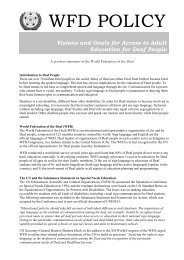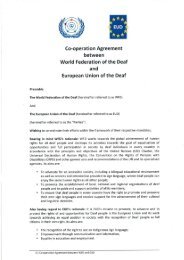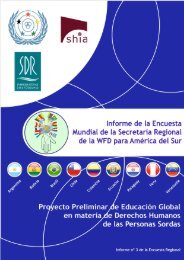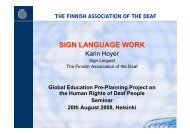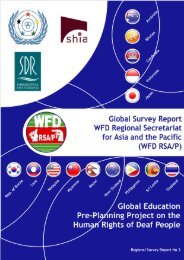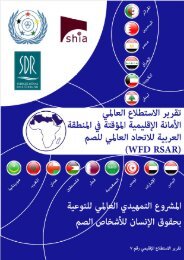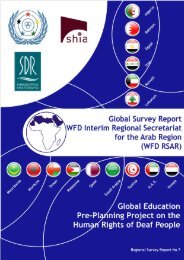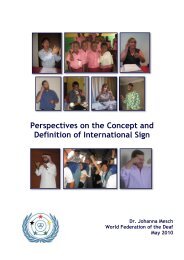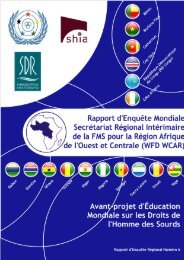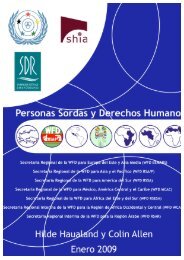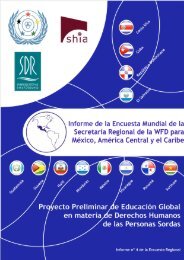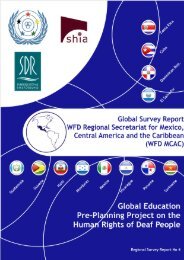Page No 1 - World Federation of the Deaf
Page No 1 - World Federation of the Deaf
Page No 1 - World Federation of the Deaf
Create successful ePaper yourself
Turn your PDF publications into a flip-book with our unique Google optimized e-Paper software.
sign language interpreters provide voluntary services for all assignments and three o<strong>the</strong>r countries (Belarus, Russian <strong>Federation</strong><br />
and Uzbekistan) stated that <strong>the</strong>ir interpreters do voluntary services sometimes.<br />
The question seeking whe<strong>the</strong>r each country has a National Association <strong>of</strong> Sign Language Interpreters brought to light that only<br />
three countries (Bulgaria, Kazakhstan and Ukraine) have a national organisation for Sign Language Interpreters. However, six <strong>of</strong><br />
<strong>the</strong> eight countries (Belarus, Bulgaria, Kazakhstan, Moldova, Russian <strong>Federation</strong> and Ukraine) have <strong>the</strong>ir own national Code <strong>of</strong><br />
Ethics for Sign Language Interpreters.<br />
The last question for this section sought information about legislation or policies which state <strong>the</strong> government has a<br />
responsibility for <strong>the</strong> provision <strong>of</strong> sign language interpreting services. Only two countries (Kazakhstan and Russian <strong>Federation</strong>)<br />
reported in <strong>the</strong> affirmative and provided <strong>the</strong> title <strong>of</strong> <strong>the</strong>ir legislation, which can be found on page 66.<br />
4.9 Employment<br />
This survey was seeking to ga<strong>the</strong>r information on <strong>the</strong> setting <strong>of</strong> <strong>the</strong> employment for <strong>Deaf</strong> people in <strong>the</strong> region <strong>of</strong> WFD EEMARS.<br />
The first question was to confirm whe<strong>the</strong>r <strong>the</strong> government considers <strong>Deaf</strong> people to have a right to be employed and earn a<br />
standard salary. One country (Armenia) stated ‘<strong>No</strong>’; <strong>the</strong> seven o<strong>the</strong>r countries stated ‘Yes’. Next question was whe<strong>the</strong>r any <strong>of</strong><br />
<strong>the</strong> country governments have any anti-discrimination laws in <strong>the</strong> area <strong>of</strong> employment, especially for <strong>Deaf</strong> people or People<br />
with Disabilities. Again Armenia does not have any laws against discrimination <strong>of</strong> <strong>Deaf</strong> people or People with Disabilities. O<strong>the</strong>r<br />
seven countries had provided <strong>the</strong>ir list <strong>of</strong> <strong>the</strong> legislation or policies relating to anti-discrimination in employment that can be<br />
found on page 67.<br />
The issue on <strong>the</strong> status <strong>of</strong> any <strong>of</strong>ficial or appropriate figures on <strong>the</strong> number <strong>of</strong> <strong>Deaf</strong> people who are in paid employment in each<br />
country, only six countries (Armenia, Belarus, Kazakhstan, Moldova, Ukraine and Uzbekistan) provided this information.<br />
Country<br />
Total Number <strong>of</strong> <strong>Deaf</strong> People employed<br />
Republic <strong>of</strong> Armenia 350<br />
Republic <strong>of</strong> Belarus 4,881<br />
Republic <strong>of</strong> Kazakhstan 4,933<br />
Republic <strong>of</strong> Moldova 1,427<br />
Ukraine 3,381<br />
Republic <strong>of</strong> Uzbekistan 9,627<br />
Total 24,599<br />
Ano<strong>the</strong>r question was asked to provide information on <strong>the</strong> number <strong>of</strong> <strong>Deaf</strong> people who are unemployed, and three countries<br />
(Armenia, Moldova, and Ukraine) responded.<br />
Country Total Number <strong>of</strong> <strong>Deaf</strong> People unemployed<br />
Republic <strong>of</strong> Armenia 3,150<br />
Republic <strong>of</strong> Moldova 1,152<br />
Ukraine 587<br />
Total 4,889<br />
Each association was asked to tick <strong>the</strong> most common areas <strong>of</strong> work for <strong>Deaf</strong> people in <strong>the</strong>ir country with <strong>the</strong> results being:<br />
Most Common areas <strong>of</strong> work for <strong>Deaf</strong> people in WFD EEMARS<br />
Country/Average Percentage<br />
Based on eight respondents<br />
Building 7 Countries (88%)<br />
Tailoring 7 Countries (88%)<br />
Hairdresser 6 Countries (75%)<br />
Painter 6 Countries (75%)<br />
Printer 6 Countries (75%)<br />
Bakery 5 Countries (63%)<br />
Car Mechanic 5 Countries (63%)<br />
Carpentry 5 Countries (63%)<br />
Catering 5 Countries (63%)<br />
Cleaning 5 Countries (63%)<br />
Farm Work 5 Countries (63%)<br />
Shoe Repairing 5 Countries (63%)<br />
Theatre/Arts 5 Countries (63%)<br />
The Project is under <strong>the</strong> auspices <strong>of</strong> <strong>the</strong> Swedish National Association <strong>of</strong> <strong>the</strong> <strong>Deaf</strong> (SDR) and <strong>the</strong> <strong>World</strong> <strong>Federation</strong> <strong>of</strong> <strong>the</strong> <strong>Deaf</strong> (WFD) <strong>Page</strong> <strong>No</strong> 21<br />
and funded by <strong>the</strong> Swedish Agency for International Development Cooperation (Sida) and Swedish Organisations <strong>of</strong> Disabled Persons<br />
International Aid Association (Shia).



